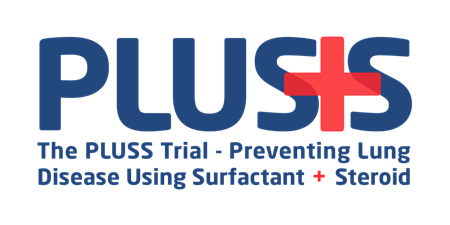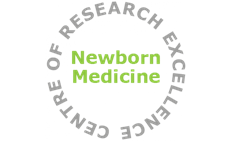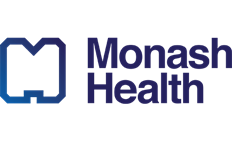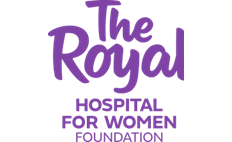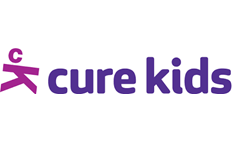Parents and Families
Thank you for your interest in the PLUSS Trial.
If you cannot find the information you are looking for on this page, please feel free to contact us by clicking on this link here
Many babies born at less than 28 weeks (or 12 weeks early) need breathing support from birth. This can be through a tube in their windpipe connected to a breathing machine (ventilator), or through their nose via prongs or a mask (such as with continuous positive airway pressure, CPAP).
Around half these babies will develop a lung condition called bronchopulmonary dysplasia (BPD). Babies with BPD need prolonged breathing support and oxygen in the neonatal intensive care unit (NICU) for many weeks or months. Babies with BPD are more susceptible to chest infections and wheezing illnesses in childhood and beyond.
Babies born extremely prematurely may have stiff and poorly expanded lungs because of low levels of a natural substance called surfactant that we all have in our lungs. This is called respiratory distress syndrome (RDS). Most extremely premature babies with RDS receiving breathing support are treated with surfactant given directly into the lungs via a tube in the windpipe.
Airway inflammation is thought to be responsible for the development of BPD. Some babies do receive systemic corticosteroids (given with feeds or intravenous) to reduce lung inflammation. However, giving steroids in this way can cause problems with how preterm babies grow and develop. Even though airway inflammation is present in the first week after birth, systemic steroids are usually avoided. An alternative is to give steroids directly into lungs to minimise the side effects of systemic treatment.
In the PLUSS study we are comparing babies who receive the standard treatment – surfactant via their windpipe with babies who will also receive surfactant and Budesonide (steroid) via their windpipe to reduce the rate of BPD.
Surfactant only Group
Half the infants in PLUSS will receive surfactant alone.
Surfactant and Budesonide Group
Half the infants in PLUSS will receive surfactant and budesonide (steroid)
We are enrolling 1060 infants into the PLUSS study, 530 babies in each group
This study is being conducted by a collaborative group of doctors from Australia, New Zealand Canada and Singapore. The study is sponsored by the Murdoch Children’s Research Institute, Melbourne Australia.
Babies can join this study if they are born between 22 weeks and 27 weeks of pregnancy and need help to start breathing at birth. Your baby will be in the study from when they are born until they are about 2 years old.
Babies can be enrolled in the study if they are born between 22 and 27 weeks of pregnancy and will need surfactant to help with breathing. Babies remain in the study until they are around 2 years old.
If your baby is eligible to join the study you will be asked to sign a consent form.
You do not get to choose which group your baby is put in to. To try to make sure the groups are the same, each baby is put into a group by chance (random). Your baby has an equal (one in two) chance of being in either group – the surfactant only group or the surfactant and budesonide group.
This research project has been designed like this to make sure the researchers interpret the results in a fair and appropriate way and avoids study doctors jumping to conclusions.
We will collect information about your baby’s progress from the normal data that is collected about all babies via hospital medical records.
We will also collect information on the long-term progress of your child by inviting you and your child to an appointment when they are about 2 years old, to see how they have grown and developed. We will also collect medical information about the pregnancy from the mother’s medical history.
We cannot promise that your baby will get any benefits from this study; however, possible benefits may include your baby being less likely to develop BPD if the budesonide helps. The results of this study will be used to improve the care of extremely premature babies in the future.
Medical treatments often cause side effects. Your baby may have none, some or all of the effects listed below, and they may be mild, moderate or severe. If your baby has any of these side effects, or you are worried about them, talk with us. We will also be looking out for side effects. There may be side effects that we do not expect or do not know about and that may be serious. Tell us immediately about any new or unusual symptoms that your baby gets.
Many side effects go away shortly after treatment ends. However, sometimes side effects can be serious, long lasting or permanent. If a severe side effect or reaction occurs, the study doctor may need to stop your baby’s treatment. Your baby’s study doctor will discuss the best way of managing any side effects with you.
Providing extremely premature infants with “systemic steroids” in the first week of birth (either into the stomach or the bloodstream), is often restricted to the sickest of babies because of concerns about side effects. Side effects of systemic steroids include:
- Immediate – elevated blood pressure, elevated blood sugar levels, and increased risk of bleeding in the intestine.
- Longer term – developmental delay and cerebral palsy (a permanent physical disability that affects movement and posture).
We believe that giving steroids mixed with surfactant directly into the lungs has fewer side effects. Research has shown that when budesonide is mixed with a different surfactant and given directly into the lungs, only a small amount (less than 4%) of the dose is detected in the baby’s blood. Two previous studies in over 300 extremely premature infants using budesonide with another surfactant did not find any side effects of this treatment. One study found no adverse effect on early childhood development when assessing children at an average age of 2 ½ years.
While in this study, there will be no restrictions to other standard treatments used in the NICU. Your baby will receive all the usual treatments, and their day-to-day care will be the same as other babies who are not in the study, apart from the study treatments.
If you do consent for your baby to participate, you may withdraw them at any time. If you decide to withdraw your baby from the study, please notify us beforehand. You do not need to tell us the reason why you want your baby to stop being a part of the project. We will inform you if there are any health risks or special requirements linked to withdrawing.
If you decide for your baby to leave the study, we will not collect additional personal information, although personal information already collected from your baby will be retained to ensure that the results of the study can be measured properly and to comply with law. You should be aware that data collected up to the time of withdrawal will form part of the study results. If you do not want your baby’s data to be included, you must tell us when withdrawing from the study.
We may contact you in the future about enrolling your baby in follow-up studies to investigate the longer-term effects of the study treatment into childhood. If you would like us to, we can send you a summary of the overall project results. The summary will be of the whole group of research study participants, not your child’s individual results.
If you have any questions, please speak to your hospital medical team. Further information about the study is also be available on this website.
Any information obtained in connection with the PLUSS trial that can identify the mother or baby will remain confidential and will only be used for the purpose of this study. All information is stored securely with access only by the research team.
Joining the clinical trial is voluntary. If you do not wish for your baby to take part, they do not have to. If you decide that they can take part and later change your mind, you are free to withdraw your baby from the trial at any stage.
Your decision that your baby can or cannot take part, or that they can take part and then be withdrawn, will not affect their routine treatment, relationship with those treating them, or their relationship with their treating hospital.
There are no additional costs associated with participation in this clinical trial, nor will you or your baby be paid. All medication, tests and medical care required as part of the research project will be provided to your baby free of charge.
This study is being conducted by The PLUSS trial team led by Associate Professor Brett Manley and Dr Omar Kamlin a collaborative group of neonatal clinical researchers from Australia and New Zealand. The trial is supported by the Murdoch Children’s Research institute and the Melbourne Children’s Trial’s Centre.
The research is funded by a National Health and Medical Research Council (Australia) project grant.
No member of the PLUSS research team will receive a personal financial benefit from your baby’s involvement in this study.
Who is responsible for your data?
The data controller for this trial is the Sponsoring organisation, the Murdoch Children’s Research Institute.
Your data will be processed in accordance with all relevant local and international Data Protection Laws and regulations.
How we use your personal data
As a publicly funded organisation, we have to ensure that it is in the public interest when we use personally identifiable information from people who have agreed to take part in research and/or clinical trials. This provides the legal basis for our use of your data; GDPR Article 6(1)(e). This means that when you agree to take part in a research study, we will use your data in the ways needed to conduct and analyse the research study. Health and care research should serve the public interest, which means that we have to demonstrate that our research serves the interests of society as a whole. To ensure we carry out the research to the highest standards we comply with all national and international Clinical Trial Regulations and Standards for the conduct of Human Research i.e. the National Health and Medical Research Council (NHMRC) National Statement on Ethical Conduct in Human Research and the European Union’s Clinical Trials Regulation 536/2014 amongst others.
How long we keep your data
The Sponsor will keep personal data about you for up to 25 years after the study has finished in line with relevant legislation.
At the end of this retention period, your personal data will either be deleted or rendered anonymous (non-identifiable).
We may need to retain personal data for longer if it is necessary to fulfil our purposes, including any relating to legal or reporting requirements. We may also retain personal data for further research for which a legal basis exists. This will always be done in accordance with relevant data protection laws.
How we protect your data
We protect your personal data against unauthorised access, unlawful use, accidental loss, corruption or destruction.
We use technical measures such as encryption and password protection to protect your data and the systems they are held in. We also use operational measures to protect the data, for example by limiting the number of people who have access to the databases in which your data is held and using unique reference numbers to identify participants rather than names wherever possible.
We keep these security measures under review and refer to Institute Security Policies to keep up to date with current good practice.
Sharing your data
Your personal data which are collected and managed by the Sponsor will be used only to allow us to carry out this clinical trial. Data from which you cannot be identified may be shared with other research groups in the future, who are doing similar research. This ‘de-identified’ information will not identify you and will not be combined with other information in a way that could identify you. The information will only be used for the purpose of health and care research and cannot be used to contact you or to affect your care. It will not be used to make decisions about future services available to you, such as insurance.
What can you expect from us?
- We will protect any personal information you provide to us or that we collect about you at all times in accordance with applicable regulatory standards and our legal obligations.
- We will notify you if our information collection and storage practices change.
- If for some reason your personal information was released to or accessed by unauthorized persons, we will notify you as necessary to help protect you from harm, embarrassment or distress.
- More information can be obtained via the MCRI General Privacy Policy.

